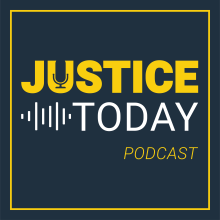Tribal Law Enforcement
A National Portrait of Project Safe Neighborhoods Implementation
Missing Native American Persons: Nebraska Study Details Scope of Problem, Urges Culturally Sensitive Research and Better Access to Justice
Just Science Podcast: Just Investigative Support for Indigenous Communities
Tribal Crime, Justice, and Safety, Part 2
Stacy Lee Reynolds and Christine (Tina) Crossland continue their discussion of tribal crime, justice, and safety, including how Native American persons experience crime victimization at higher rates than non-Native people and the jurisdictional complexities in responding to tribal crime, justice, and safety. Read the transcript.
Listen to the first half of Stacy and Tina’s discussion.
Reading and Resources from NIJ
Tribal-Researcher Capacity Building Grants
Tribal Crime, Justice, and Safety
Tribal Crime, Justice, and Safety, Part 1
Research indicates that Native American persons experience crime victimization at higher rates than non-Native people. Furthermore, the unique position of American Indian and Alaska Native tribes as both sovereign nations and domestic dependents of the U.S. creates jurisdictional complexities in responding to crime, justice, and safety. Senior social and behavioral scientist Christine (Tina) Crossland discusses NIJ’s research on these topics, especially on the prevention of violence towards American Indians and Alaska Natives. Communications Assistant Stacy Lee Reynolds hosts.
Law Enforcement Perceptions of Cannabis Legalization Effects on Policing: Challenges of Major Policy Change Implementation at the Street Level
A Descriptive Analysis of Missing and Murdered Native Women and Children in Nebraska, Barriers to Reporting and Investigation, and Recommendations for Improving Access to Justice
Multilevel Evaluation of Project Safe Neighborhoods
Project Safe Neighborhoods (PSN) is a DOJ-sponsored initiative to reduce violent crime, particularly gun crime, by fostering cooperation by criminal justice agencies and local partners to develop and implement strategic approaches.
See the YouTube Terms of Service and Google Privacy Policy
NIJ-Funded Research on Mass Shootings to Advance Evidence-Based Policy and Practice
Mass public shootings continue to threaten communities in the United States, yet research on this criminal phenomenon is limited. In this full thematic panel, renowned experts will present a series of research projects summarizing NIJ-funded research projects’ newest findings on public mass shootings. The discussion will focus on NIJ’s investment to address the phenomenon of mass shootings through innovative study approaches to advance our understanding of mass shootings and inform prevention efforts. The implications of this research to criminal justice will also be discussed.
See the YouTube Terms of Service and Google Privacy Policy
Bureau of Justice Statistics: Survey of Law Enforcement in Public Schools - Roundtable Discussion, NIJ Virtual Conference on School Safety
On February 16-18, 2021, the National Institute of Justice hosted the Virtual Conference on School Safety: Bridging Research to Practice to Safeguard Our Schools. This video presents a roundtable discussion from that conference.
See the YouTube Terms of Service and Google Privacy Policy
Disparity Between Fusion Center Web Content and Self-Reported Activity
Institutional Pressures and Isomorphism: The Impact on Intelligence-Led Policing Adoption
Homeland Security and Public Health: A Critical Integration
Law Enforcement's Information Sharing Infrastructure: A National Assessment
Effects of Marijuana Legalization on Law Enforcement and Crime: Final Report
Effects of Marijuana Legalization on Law Enforcement and Crime: Executive Summary
Research and Evaluation on Drugs and Crime, FY 2017 Solicitation Webinar
This webinar will provide details and guidance for potential applicants to the National Institute of Justice's Research and Evaluation of Drugs and Crime FY 2017 solicitation. The presenters will discuss the purpose and goals of this funding opportunity and address frequently asked questions. A Q&A session will conclude this webinar.
See the YouTube Terms of Service and Google Privacy Policy






